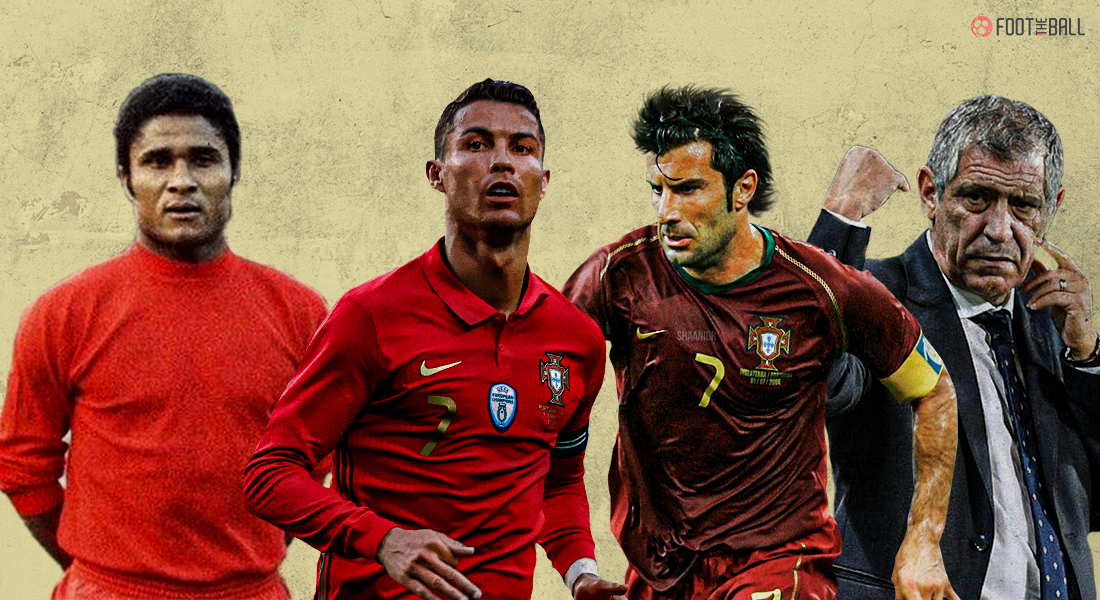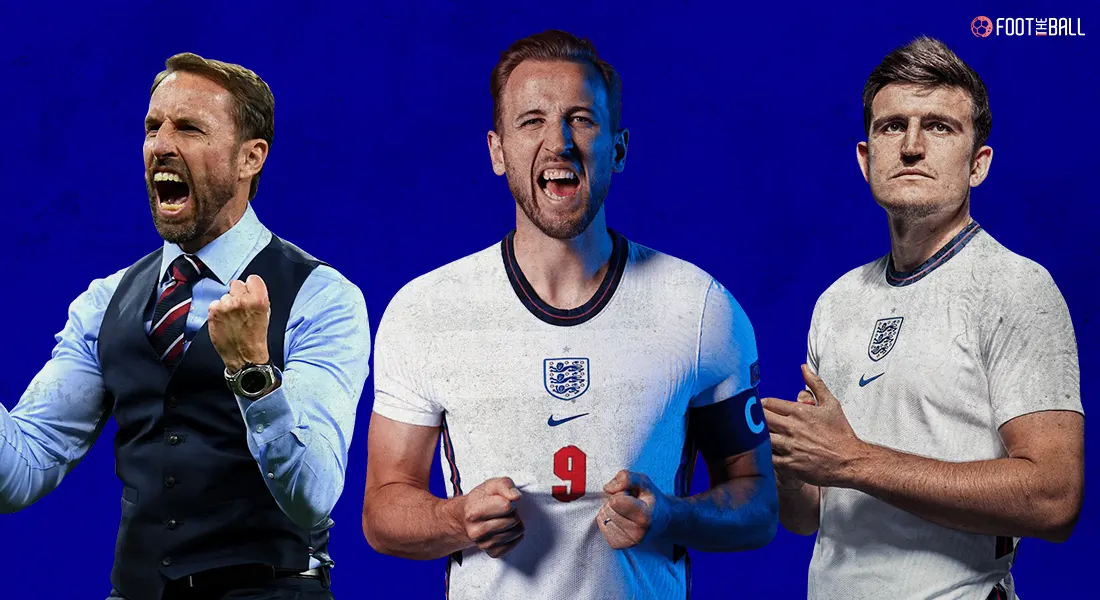Portugal are celebrating 100 years of their first international match this year, and they can ramp up the celebration by retaining their European champion status.
Portugal is a peninsular country in south-western Europe. Once one of the trade capitals of the world, Portugal has a rich culture and history. Even in football, they stand out when compared to other European countries with a touch of South American flair to their game. This came as a part of cultural exchange from their former colony Brazil.
Despite giving many greats to the footballing world, their first international success only came in 2016, when they were crowned as the European champions at Euro 2016 in France, where they defeated the hosts in extra time.
Partida, largada… 𝙀𝙐𝙍𝙊𝙋𝙀𝙐! 🛬🏆 #VamosComTudo
Ready, set…. 𝙀𝙐𝙍𝙊! 🛬🏆 #TeamPortugal #EURO2020 pic.twitter.com/69ol3yL15A
— Portugal (@selecaoportugal) June 10, 2021
As Euro 2020 finally begin after getting delayed for a year due to the coronavirus pandemic and Ronaldo and co. look forward to their first-ever title defence, we, at FootTheBall, take a look at their football history, culture and philosophy.
HISTORY OF FOOTBALL IN PORTUGAL
The roots of football in Portugal go back to 1921 when they played their first international match, a 3-1 defeat against Spain. Their first international tournament was the 1928 Olympics, they finished fourth in the tournament.
Portugal wasn’t invited to the 1930 World Cup and failed to qualify for the next six editions. It was in 1966 when they finally made it to the World Cup finals and finished third. Their next appearance came after 20 years and they only became regulars at the competition post 2002. Their best performance at the global event came in 2006 when they finished fourth.
A Revolta dos Magriços. ✊
Neste dia, em pleno Mundial de 1966, Portugal virou um 0-3 para um 5-3 histórico e venceu a Coreia do Norte com 4 golos de Eusébio. #TodosPortugal pic.twitter.com/s7sm6SPWk5
— Portugal (@selecaoportugal) July 23, 2019
At the Euros, they had a similar start, failing to qualify for the first six editions. Portugal made their first appearance at Euro 1984 and finished third in the tournament. They yet again faced disappointment in the qualifying stage at the next two editions, before finally getting a competitive team that qualified in the 1996 edition hosted in England. They came so close to lifting the trophy in 2004, but dark horses Greece shocked them and everyone else in the final and took home the trophy leaving Portuguese players in tears.
Cristiano Ronaldo:
“I’ve been motivated ever since Euro 2004. I’ve never lost that motivation even after winning Euro 2016.” pic.twitter.com/gkEBgB6p9Y
— TCR. (@TeamCRonaldo) June 11, 2021
Portugal has consistently been a part of the tournament since then, and in 2016, they had their first international glory, courtesy of an extra-time goal from super-sub Eder.
EVOLUTION OF FOOTBALL
Portuguese football was always based more on individual skills and less on teamwork and tactics. In fact, it was one of the reasons that Portuguese players were successful at top European clubs but not so much with the national side.
Portugal has had many great dribblers and goal scorers in their history, including the famous Eusebio, who is considered one of the greatest footballers ever. The Real Madrid legends Luis Figo and Cristiano Ronaldo are some other greats that were given to world football by Portugal, but the lack of an intelligent tactical set-up at the national team and constantly changing managers after every failure only set them up for another.
Eusébio, @LuisFigo e @Cristiano. 3 lendas que marcaram o futebol mundial para sempre.#TeamPortugal #TheBest 🇵🇹 pic.twitter.com/4WKuGJLKAn
— Portugal (@selecaoportugal) October 24, 2017
Their football is heavily influenced by the typical Latin American style of play, full of flair and tricks. Unlike other European countries, that focused on their physicality and ability to exploit the opposition’s weaknesses to win matches, Portugal football relied more on the individual brilliance and skills of their top players to succeed.
𝐔𝐦 𝐦𝐚𝐫𝐜𝐨 𝐢𝐦𝐩𝐫𝐞𝐬𝐬𝐢𝐨𝐧𝐚𝐧𝐭𝐞! Fernando Santos chega hoje aos 1⃣0⃣0⃣0⃣ jogos na carreira de treinador! 👏 #VamosComTudo
𝐀𝐧 𝐢𝐦𝐩𝐫𝐞𝐬𝐬𝐢𝐯𝐞 𝐚𝐜𝐜𝐨𝐦𝐩𝐥𝐢𝐬𝐡𝐦𝐞𝐧𝐭! Today, coach Fernando Santos will reach 1⃣0⃣0⃣0⃣ matches in his career! 👏 #TeamPortugal pic.twitter.com/tPDVMYVUOg
— Portugal (@selecaoportugal) March 27, 2021
It was after the arrival of international coaching star Fernando Santos that Portugal looked like a team that can win by outplaying the opponent as a team and not just the individual ability of star players like Cristiano Ronaldo.
PLAYING STYLE
Portugal has always played a free-flowing attacking game that allows individuals to take control of the ball and innovate to help the team build attacks. This allowed the players to develop and grow as individuals, but the lack of team spirit and team identity caused them continuous failure.
They learnt their lessons and with time, developed a defensive structure that helps them hold down opposition attacks and fully utilise the talent and skill of their forwards in attacking transitions.
🗣️ @Cristiano Ronaldo: "In my opinion Pepe was the best player at the EUROs."
⏪🇵🇹 Rewind to Pepe's masterclass in the EURO 2016 final! #EURO2020 | #EUROmasterclass | @selecaoportugal | @officialpepe pic.twitter.com/iOFID0GoOK
— UEFA Nations League (@EURO2024) June 1, 2021
The likes of Cristiano Ronaldo, Luis Figo and Eusebio have always provided them with the goals from the central zone with their brilliant shooting ability.
Currently, under Fernando Santos, Portugal plays a 4-4-2 or a 4-3-3 formation, depending upon the defensive cover required. Two holding midfielders protect the backline and also help the team in building quick attacks with the likes of Joao Felix and Bernardo Silva on the flanks.
𝘾𝘼𝙈𝙋𝙀𝙊𝙉! 🇪🇸🏆 @joaofelix70 vence a La Liga com o @Atleti! 🇵🇹 #VamosComTudo
𝘾𝘼𝙈𝙋𝙀𝙊𝙉! 🇪🇸🏆 João Felix wins La Liga with Atlético Madrid! 🇵🇹 #TeamPortugal pic.twitter.com/Lp6OhW10z1
— Portugal (@selecaoportugal) May 22, 2021
Despite adding more to the tactical side of the team, Portugal did not lose its flair and skill on the ball. In fact, the coming generation is as skilled and crafted as the previous ones, if not more.
GOLDEN GENERATION
The golden generation of Portuguese footballers came in the late 20th century, around the time Portugal found its feet in world football. A new breed of players had arrived from the youth teams, that won the U20 World Cup in 1989 and 1991 and became the leading figures of the senior side by the end of the century.
O 'Maestro' Rui Costa faz anos! 🇵🇹🎼 Todos, em coro: "Parabéns a você…". #TodosPortugal pic.twitter.com/9AlZam0BaJ
— Portugal (@selecaoportugal) March 29, 2020
Players like Luis Figo, Rui Costa and Joao Pinto took the centre stage at Euro 1996 and managed to reach the quarter-finals of the tournament. In the next edition, they lost the semi-final to eventual winners France and finished third. They further progressed to the final in 2004, where Greece upset the favourites Portugal in the final.
Ricardo Carvalho & Cristiano Ronaldo started the EURO 2004 final against Greece in Portugal. #PORFRA #EURO2016 pic.twitter.com/NcHTkyTUBB
— UEFA Nations League (@EURO2024) July 10, 2016
Portugal’s golden generation could not achieve glory, but was one of the most talented teams of their generation, with most players playing at top European clubs. Some might argue that the current team is more talented, but the fact that so many players came through at the same time is what made that team special.
FOUND GLORY UNDER FERNANDO SANTOS
After years of struggle, disappointment and hardships, Portugal finally fulfilled its potential at Euro 2016.
All these years, they had a team full of talented players who could turn the game on its head. But it needs the right coach to utilise the talent at his disposal. The advent of Fernando Santos, former manager of the Greece team that reached the quarter-finals of Euro 2012 and the Last 16 of the 2014 World Cup, helped the Portugal national team find an identity.
The team looked found a shape that they could build upon. He started his tenure at the Selecao in September 2014 and played the first International tournament in 2016, The Euros.
😍 4 𝘢𝘯𝘰𝘴 𝘥𝘦𝘱𝘰𝘪𝘴, o regresso a um estádio muito especial vai acontecer! Vemo-nos amanhã, 𝗦𝘁𝗮𝗱𝗲 𝗱𝗲 𝗙𝗿𝗮𝗻𝗰𝗲! 🏟
🏆 10/07/2016 – Campeões da Europa
⭐ 11/10/2014 – Estreia de Fernando Santos#VamosTodos #VamosComTudo pic.twitter.com/S3sb53bSC3— Portugal (@selecaoportugal) October 10, 2020
Portugal drew all three of their group games and qualified to the next round with the best 3rd placed teams rule. They won the Round of 16 tie in extra time, with a late Quaresma tiebreaker against Croatia.
After defeating the dark horse Wales in the semi-final, Portugal faced the most dangerous team of the competition, the hosts in the final. Paris was prepared to see their team lift the trophy, but a committed Portugal was there to create history.
France had scored 13 goals in the six games played in the tournament but was held to a goalless 90 minutes by the Selecao. And despite losing Cristiano Ronaldo 25 minutes into the final due to injury, Portugal secured their first international trophy with a 109’ minute goal from the 28-year old substitute Eder.
THE TITLE DEFENCE
Portugal enters Euro 2020 as the defending champions and ready to defend their first-ever international trophy. The team has drastically improved from their previous appearance with new faces like Joao Felix, Diogo Jota and Ruben Neves taking the centre stage.
🏆🇵🇹 A defesa do título vai começar! Estamos a 5⃣0⃣ dias do Euro 2020! #VamosComTudo
🏆🇵🇹 Our title defense starts soon! We're 5⃣0⃣ days away from the #EURO2020! #TeamPortugal pic.twitter.com/2LtTHE8tUe
— Portugal (@selecaoportugal) April 22, 2021
Senior experienced players like Ronaldo, Rui Patricio and Jose Fonte will still be there to provide the essential support in both attack and defence but their shoulders have been weighed off by the rising talent in the Selecao.
Another great find for Portugal has been Manchester United’s player of the year Bruno Fernandes, who is tipped to be the MVP for the national team if they are to successfully defend their championship status.
Fernando Santos enters the seventh year of taking charge of the national side and would like to extend his trophy count to three, having already won the Euros in 2016 and the inaugural Nations League in 2019. Drawn in the group of death that has Germany, France and Hungary alongside Portugal will be a treat to watch for the spectators. Despite the difficult group, Portugal are favourites to go through to the Last 16 and even further in the tournament.




